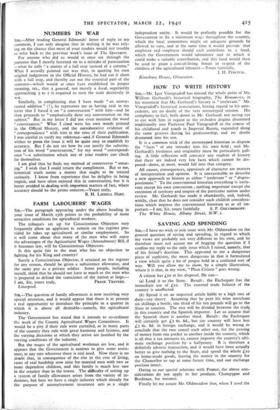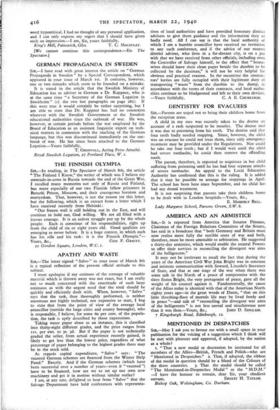SAVING AND SPENDING SIRS I have no wish to join
issue with Mr. Oldmeadow on the general question of saving and spending, in regard to which my views are probably not very different to his own, and he therefore must not accuse me of begging the question if I confine my reply to the only issue which I raised, namely, that of his friend's doctrine. This appeared to me a dangerous piece of sophistry, the more dangerous in that it formulated a view which quite a lot of people hold in a confused sort of way. Will you allow me to show, by a simple illustration, where it is that, in my view, " Plain Citizen " goes wrong.
A citizen has Do at his disposal. He can—
(a) Lend it to the State. Result : the Exchequer has the immediate use of Do. The external trade balance of the country is unaffected.
(b) Spend it on an imported article liable to a high rate of duty—say sherry. Assuming that he pays his wine merchant six shillings a bottle, one third of his ten pounds will go to the State in taxation. The rest will be divided between the trade in this country and the Spanish importer. Let us assume that the Spanish share is another third. Result : the Exchequer will certainly get £3 6s. 8d., but the country will have lost £3 6s. 8d. in foreign exchange, and it would be wrong to conclude that the two cancel each other out, for the passing of money from one pocket to another inside the country, which is all that a tax amounts to, cannot improve the country's ulti- mate exchange position by a halfpenny. B is therefore a definitely adverse transaction, and it would have been actually better to give nothing to the State, and spend the whole Li° on home-made goods, leaving the money in the country for the Chancellor to tap at some future time, and our exchange position intact.
Owing to our special relations with France, the above con- siderations do not apply to her produce, Champagne and Bordeaux, for instance.
Finally let me assure Mr. Oldmeadow that, when I used the word hypocritical, I had no thought of any personal application, and I can only express my regret that I should have given such an impression.—I am, Sir, yours faithfully,
[We cannot continue this correspondence.—En. The Spectator.]







































 Previous page
Previous page